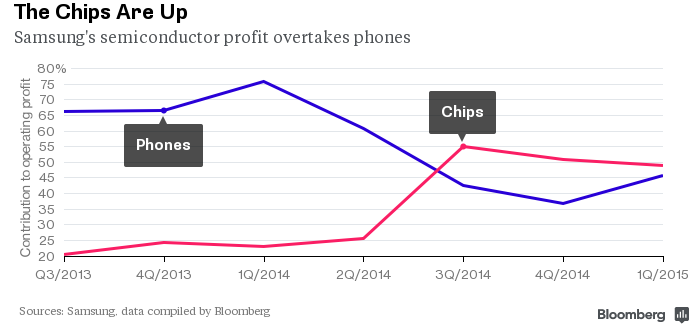With Samsung and Apple buddies again, other tech firms should be nervous

Samsung's semiconductor profits now make up the majority of the black ink produced by the company
Last August, Apple CEO Tim Cook decided to stop the bloodshed and started to initiate peace efforts with Samsung. The two had been going at each other with patent infringement suits that made the first page of major newspapers. Now, both tech titans are teaming up on certain components which will take business away from the competition.
Another company that is feeling the financial heat from Apple and Samsung's new found love for each other is SanDisk. The latter produces chips for mobile devices like the Apple iPhone and Apple iPad. While Apple was once SanDisk's largest customer, accounting for 19% of its revenue, those days are apparently gone. On April 15th, SanDisk said that it expected to report lower than expected sales for the year as its loses customers for its chips. Apple would certainly be on that list.
For Samsung, its resurgence in chip sales came at a perfect time. 2014 was a poor year for the company's smartphone business as it dropped from contributing 75% of Sammy's profits in the first quarter of 2014 to 37% by the fourth quarter of last year. Meanwhile, chip profits went from accounting for 20% of the company's profits in the third quarter of 2013 to contributing 55% of the profits a year later. Since then, Samsung's chip business has been outperforming its phone business. Although that might change with the success of the Samsung Galaxy S6 and Samsung Galaxy S6 edge, it doesn't take away from the fact that Samsung is growing its semiconductor profits.
But in a strange twist, the San Diego based Qualcomm, which had been using TSMC to produce some of is chips, could be relying on Samsung's 14nm FinFET process for the Snapdragon 820 chipset. Using its cutting edge manufacturing technique, Samsung is able to get a higher yield and produce a superior product. That is one reason why Apple is turning to Samsung and away from TSMC for the A9.
source: Bloomberg
Follow us on Google News












Things that are NOT allowed:
To help keep our community safe and free from spam, we apply temporary limits to newly created accounts: